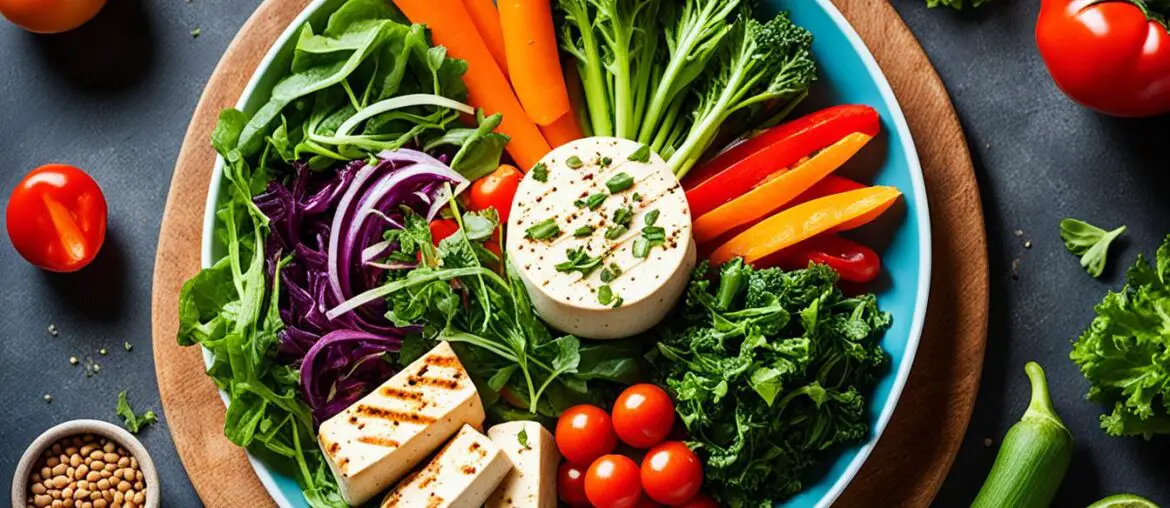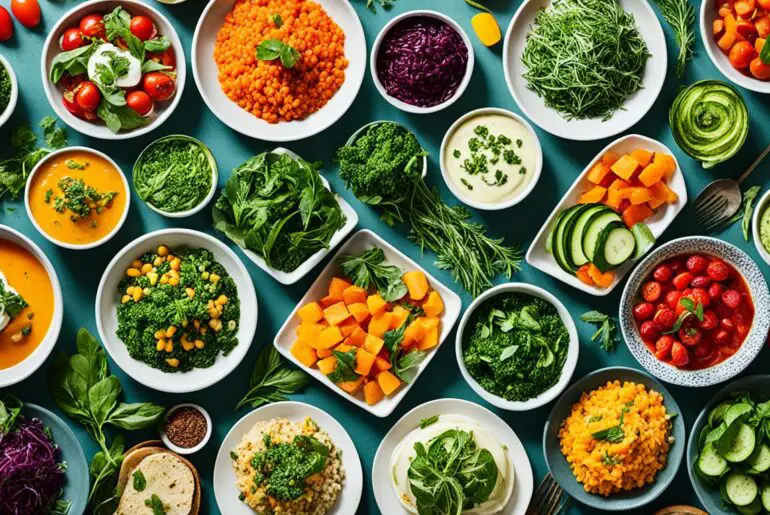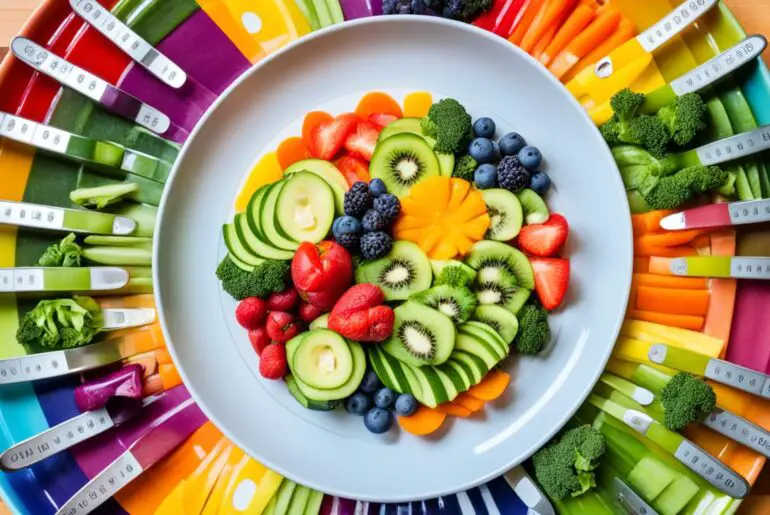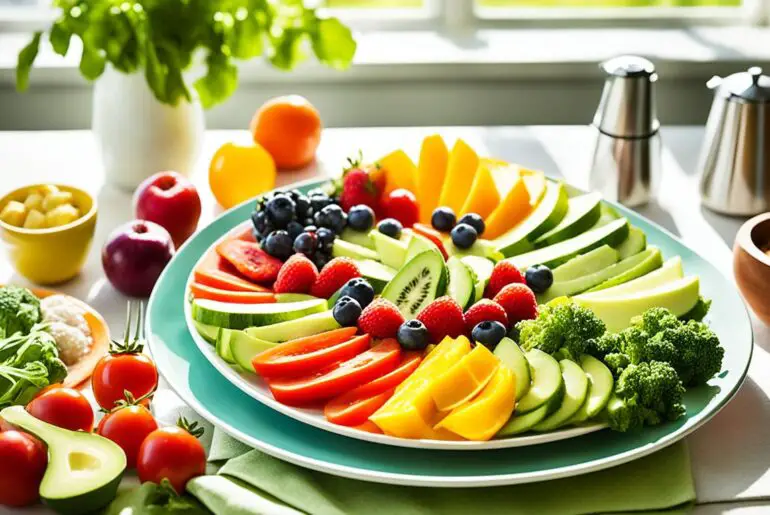Are you a vegetarian looking for a diet that promotes healthy weight loss without leaving you feeling hungry all the time? Look no further! I have just the solution for you. The Vegetarian HCG Diet allows you to enjoy the benefits of the HCG diet while following a plant-based meal plan. Say goodbye to hunger pangs and hello to a slimmer, healthier you!
The HCG diet, which combines a low-calorie regimen with hormone injections, has been praised for its ability to redistribute fat and suppress appetite. However, for vegetarians, the challenge lies in finding protein sources that are compatible with their lifestyle. Thankfully, there are plenty of vegetarian-friendly options available that can provide the necessary nutrients without compromising the effectiveness of the diet.
So, how can you enjoy the benefits of the HCG diet while following a vegetarian lifestyle? In this article, we will explore the ins and outs of the Vegetarian HCG Diet, from understanding vegetarian diets to essential groceries and protein options. Get ready to discover a hunger-free weight loss journey that aligns perfectly with your plant-based diet!
Key Takeaways:
- The Vegetarian HCG Diet allows vegetarians to experience the benefits of the HCG diet without compromising their plant-based lifestyle.
- Understanding the different types of vegetarian diets is crucial for finding suitable protein substitutes.
- Cottage cheese, tofu, legumes, and eggs are excellent sources of vegetarian-friendly protein for the HCG diet.
- The Vegetarian HCG Diet follows three main phases: loading phase, weight loss phase, and maintenance phase.
- By following the Vegetarian HCG Diet, vegetarians can achieve successful and sustainable weight loss results without sacrificing their dietary preferences.
Understanding Vegetarian Diets
Vegetarian diets have gained popularity due to their numerous health benefits and ethical considerations. They exclude meat products, making them suitable for individuals seeking a plant-based lifestyle. Variations of vegetarian diets exist, including vegan, Lacto-Vegetarian, and Lacto-Ovo Vegetarian, each with its own restrictions and allowances.
Vegans follow a strict plant-based diet that excludes any animal-derived products, including dairy, eggs, and honey.
Lacto-Vegetarians include dairy products in their diet, such as milk, yogurt, and cheese, but abstain from meat, fish, poultry, and eggs.
Lacto-Ovo Vegetarians consume both dairy products and eggs while excluding meat, fish, and poultry.
When it comes to the vegetarian HCG diet, individuals following a vegetarian lifestyle face a unique challenge of replacing meat protein. Nuts and legumes, which are common sources of protein for vegetarians, are not allowed on the HCG diet due to their high fat and calorie content.
To ensure an adequate intake of protein while adhering to the vegetarian HCG diet, non-meat eaters can turn to alternative sources such as:
- Organic milk
- Cottage cheese
- Tofu
- Legumes
- Eggs
These protein substitutes offer the necessary nutrients without compromising the principles of the vegetarian lifestyle.
The image above showcases the diversity of vegetarian protein options, providing a visual representation of the bountiful choices available for individuals on the vegetarian HCG diet.
Comparison of Vegetarian Diets
| Diet Type | Dairy Products | Eggs |
|---|---|---|
| Vegan | No | No |
| Lacto-Vegetarian | Yes | No |
| Lacto-Ovo Vegetarian | Yes | Yes |
The table above highlights the key differences between vegan, Lacto-Vegetarian, and Lacto-Ovo Vegetarian diets, focusing on the inclusion or exclusion of dairy products and eggs. Understanding these variations allows individuals to make informed decisions when it comes to following a specific vegetarian diet plan.
Essential Groceries for Vegetarian HCG Diet
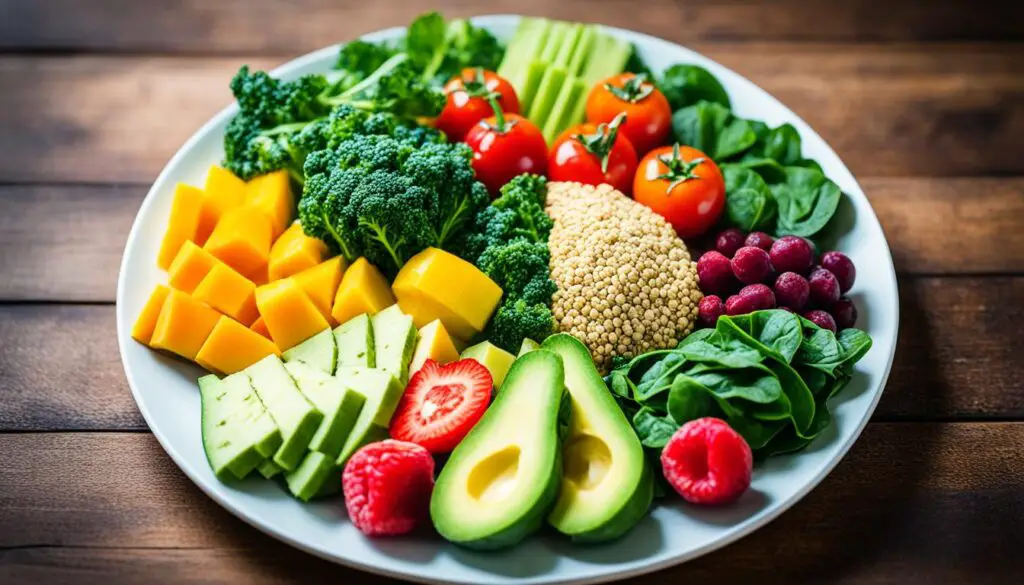
When following the vegetarian HCG diet, it is crucial to have a well-curated grocery list that includes high-protein alternatives and protein substitutes. These options will help you meet your recommended daily protein intake without exceeding calorie limits. Below are some essential groceries you should consider:
Cottage Cheese
Cottage cheese is a versatile and protein-rich food that can be a staple in your vegetarian HCG diet. With approximately 30g of protein per cup, it provides a significant portion of your daily protein requirements while being low in calories. Cottage cheese can be enjoyed plain or incorporated into various recipes.
Tofu
Tofu is another excellent source of vegetarian protein for the HCG diet. With roughly 20g of protein per cup, it offers a substantial amount of protein while being low in calories. Tofu can be used in stir-fries, salads, or even blended into smoothies for an added protein boost.
Legumes
Legumes such as soy and pea protein are excellent vegetarian-friendly protein sources for the HCG diet. They provide a good balance of protein, fiber, and nutrients. Legumes can be used as an alternative to meat in recipes or enjoyed as a side dish.
Eggs
Eggs are a versatile and protein-packed choice for vegetarians on the HCG diet. One whole egg contains around 6g of protein, while three egg whites provide an additional 11g of protein. Eggs can be enjoyed boiled, scrambled, or incorporated into various dishes like omelets and frittatas.
By including these essential groceries in your shopping list, you can ensure you have a variety of high-protein alternatives and protein substitutes to support your vegetarian HCG diet journey.
| Grocery | Protein per Serving |
|---|---|
| Cottage Cheese | 30g per cup |
| Tofu | 20g per cup |
| Legumes (e.g., soy, pea protein) | Varies |
| Eggs (1 whole egg + 3 egg whites) | Approximately 17g |
Having these protein-rich groceries readily available will help you adhere to the vegetarian HCG diet while ensuring you meet your nutritional needs. Remember to incorporate a variety of these options into your daily meal plan to enjoy a diverse and satisfying diet.
Vegetarian HCG Diet Plan
Following a vegetarian lifestyle shouldn’t deter you from experiencing the benefits of the HCG diet. With a few modifications, you can successfully navigate the weight loss phases while enjoying a vegetarian meal plan. Let’s delve into the three main phases of the vegetarian HCG diet and explore some meal options.
1. Loading Phase
The loading phase initiates the HCG diet by consuming calorie-dense foods to signal the release of the hormone. While non-vegetarians might opt for fatty meats, vegetarians can embrace high-fat vegetarian options such as avocado, nuts, seeds, and oils. This phase typically spans two days, allowing you to stock up on energy stores.
2. Weight Loss Phase
The weight loss phase is the core of the HCG diet, where a calorie-restricted plan of 500-1200 calories per day is followed. Instead of animal protein sources, vegetarian options rich in nutrients and protein take center stage. Your meal plan should revolve around vegetable soups, salads, and protein choices such as organic milk, cottage cheese, tofu, legumes, and eggs.
3. Maintenance Phase
Once you’ve achieved your weight loss goals, it’s time to transition to the maintenance phase. This stage allows for the reintroduction of certain food options, although ongoing weight loss is not expected. Incorporate a wider variety of vegetarian-friendly foods into your diet, including whole grains, fruits, and a larger selection of vegetables.
Sample Vegetarian Meal Plan
Here’s a sample meal plan to give you an idea of how a day on the vegetarian HCG diet might look:
| Meal | Options |
|---|---|
| Breakfast | Tea or coffee with milk |
| Lunch | Spinach salad with cottage cheese, cucumbers, and lemon vinaigrette |
| Snack | Apple slices with a tablespoon of almond butter |
| Dinner | Baked tofu with steamed broccoli and a side of quinoa |
| Snack | Sliced strawberries with a dollop of Greek yogurt |
Remember, it’s important to consult with a healthcare professional or registered dietitian before starting any weight loss program, including the HCG diet, to ensure it aligns with your specific dietary needs and goals.
Protein Options for Vegetarian HCG Diet
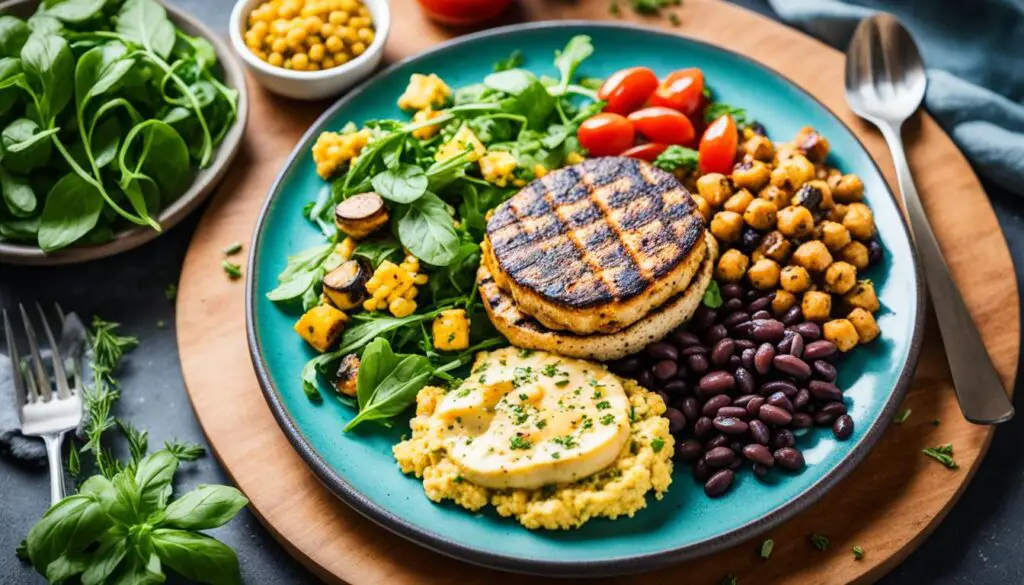
When following a vegetarian HCG diet, it is important to find suitable protein options that align with the principles of the diet while providing the necessary nutrients for your body. Here are some protein substitutes that you can consider:
- Cottage Cheese: Cottage cheese is a low-fat, high-protein option that can be used as an alternative to meat proteins. It contains about 28 grams of protein per cup, making it an excellent choice for vegetarians on the HCG diet.
- Protein Powder: Protein powders, especially those made from plant-based sources like pea or hemp, can be an excellent addition to your vegetarian HCG diet. They are convenient and versatile, allowing you to easily add protein to your meals or prepare protein-rich shakes and smoothies.
- Shake it Dairy-Free Soup: Shake it Dairy-Free soup is a plant-based protein substitute that is specifically designed for vegetarians on the HCG diet. It is low in calories and carbohydrates while providing a good amount of protein.
- Tofu: Tofu is a popular vegetarian protein option that is rich in protein, low in calories, and versatile in cooking. It can be used in various dishes, such as stir-fries, soups, and salads, to enhance the protein content of your meal.
- Tempeh: Tempeh is another soy-based protein substitute that can be used in place of meat proteins. It has a firm texture and a nutty flavor, making it a great addition to stir-fries, sandwiches, and wraps.
- Miso Soup: Miso soup, made from fermented soybeans, is a flavorful and nutritious option for vegetarians on the HCG diet. It is low in calories and provides a good amount of protein, making it a great choice for a light meal or snack.
- Eggs: Eggs are an excellent source of protein and can be easily incorporated into a vegetarian HCG diet. Whether boiled, scrambled, or used in various recipes, eggs can provide the necessary protein while adhering to the diet guidelines.
When choosing protein options for your vegetarian HCG diet, it is essential to pay attention to the nutritional content. Opt for low-fat and low-sugar options to ensure that you are meeting the requirements of the diet. Additionally, always read labels and choose products that are suited for the HCG diet and align with your vegetarian lifestyle.
Success on the Vegetarian HCG Diet
Many vegetarians have achieved remarkable weight loss success while following the vegetarian HCG diet. By following the protocol and making strategic dietary choices, individuals can experience rapid weight loss, increased energy, and improved vitality. Despite the challenge of substituting meat, vegetarians can still achieve exceptional results by incorporating vegetarian and vegan options into their meal plan.
The key to success on the vegetarian HCG diet lies in following the recommended calorie requirements and including nutrient-rich foods. By substituting meat with plant-based protein options such as tofu, tempeh, and legumes, vegetarians can maintain a balanced diet while adhering to the HCG guidelines. These protein alternatives provide the necessary nutrients for sustained energy and muscle development.
In addition to protein substitutes, including probiotics and low-sugar, low-fat foods in the vegetarian HCG diet can optimize weight loss success. Probiotics, found in fermented foods like yogurt and kimchi, promote a healthy gut, aiding digestion and enhancing nutrient absorption. Furthermore, choosing foods low in sugar and fat ensures that the body is receiving essential nutrients without excess calories.
“I’ve had incredible success on the vegetarian HCG diet. By following the protocol and incorporating plant-based protein options, I lost over 20 pounds in just 6 weeks. Not only did I achieve my weight loss goals, but I also felt more energized and rejuvenated than ever before.”
Following the vegetarian HCG diet can lead to rapid weight loss, increased energy, and overall vitality. By substituting meat with vegetarian and vegan options, adhering to the recommended calorie requirements, and incorporating probiotics and low-sugar, low-fat foods, vegetarians can achieve the same successful results as those on the regular HCG diet.
Conclusion
The Vegetarian HCG Diet Without Hunger provides a highly effective weight loss solution for individuals embracing a vegetarian or vegan lifestyle. By implementing targeted dietary modifications and selecting appropriate protein substitutes, participants can achieve successful and sustainable weight loss results. It is crucial to adhere to the recommended calorie requirements and incorporate nutritious foods into the meal plan.
The combination of the HCG diet and a plant-based eating approach allows vegetarians and vegans to benefit from the significant weight loss potential of the HCG diet while maintaining their commitment to a meat-free diet. By focusing on high-quality protein sources and following the prescribed meal plan, individuals can experience the successful outcomes associated with the traditional HCG diet.
With proper implementation and adherence, the Vegetarian HCG Diet Without Hunger can lead to substantial weight loss and improved overall health. Vegetarians will find this plan advantageous as it integrates their dietary preferences with a proven weight loss protocol. By following the recommended guidelines and incorporating exercise and healthy lifestyle habits, individuals can achieve and sustain their weight loss goals in a safe and effective manner.
FAQ
Can I follow the vegetarian HCG diet without feeling hungry?
Yes, the vegetarian HCG diet allows you to achieve weight loss without feeling hungry. By choosing high-protein alternatives and following the recommended calorie requirements, you can stay satisfied throughout the diet.
What are some protein substitutes for vegetarians on the HCG diet?
Vegetarians can substitute meat proteins with options like cottage cheese, protein powder, Shake it Dairy-Free soup, tofu, tempeh, miso soup, and eggs. These choices provide necessary protein while adhering to the HCG diet requirements.
How does the vegetarian HCG diet work?
The vegetarian HCG diet follows three main phases: the loading phase, where calorie-dense foods are consumed to signal hormone release; the weight loss phase, with a calorie-restricted diet of 500-1200 calories; and the maintenance phase, where weight loss is not expected and certain food options may be reintroduced.
Can I achieve weight loss success on the vegetarian HCG diet?
Yes, many vegetarians have successfully followed the HCG diet, achieving rapid weight loss and increased energy and vitality. By substituting meat with vegetarian and vegan options, following the recommended calorie requirements, and including probiotics and low-sugar, low-fat foods, vegetarians can achieve the same results as those on the regular HCG diet.
What should I include in my vegetarian HCG diet meal plan?
The vegetarian HCG diet meal plan includes options for breakfast (tea or coffee with milk), and lunch and dinner choices from protein, vegetable, and fruit categories. By selecting appropriate vegetarian protein sources and incorporating various vegetables and fruits, you can create a balanced and nutritious meal plan.

